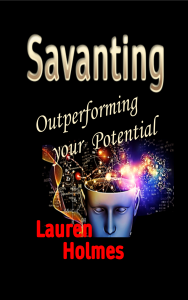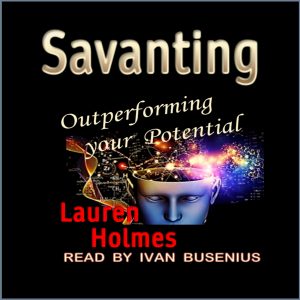AWE AND WHOLENESS
A byproduct of Savanting
Excerpt from Savanting: Outperforming your Potential, Chapter 23 by Lauren Holmes (2019)
Not only do self-actualization and self-transcendence emerge from the savantflows driving savanting, but so too does another oft-pursued goal – “awe.” This is the emotion which attracts so many to religious and spiritual organizations. It even draws extraterrestrial believers to the UFO “religion.”
 Awe is a powerfully addictive emotion. Awe experiences are innately self-transcendent. They shift our attention away from ourselves. They make us feel as if we are part of something greater than ourselves. They make us more generous toward others.
Awe is a powerfully addictive emotion. Awe experiences are innately self-transcendent. They shift our attention away from ourselves. They make us feel as if we are part of something greater than ourselves. They make us more generous toward others.

The 2003 paper of Keltner and Haidt,[i] “Approaching Awe – A Moral, Spiritual, and Aesthetic Emotion,” identifies studies which show that awe is often accompanied by feelings of self-diminishment and increased connectedness with other people. Experiencing awe often puts people in a self-transcendent state where they focus less on themselves and more on being part of a larger whole.
In this way, awe is both an altered state of consciousness and an emotional state. As such, it is akin to flow state.[ii] In fact, awe is a component of the addictive draw of flow.
Shiota et al. (2007) define awe as “an emotional response to perceptually vast stimuli that overwhelm current mental structures yet facilitate attempts at accommodation.”
Awe is one of the very rare emotions that turn our minds outwards rather than inwards. The experience of awe entices us to transcend the boundaries of our individual self. We are drawn outside of ourselves to wonder at phenomena in the natural world, the noble actions of others, or the genius of creativity. Our daily concerns and ingrained expectations of life are revised as a result.
Another consequence of the “diminished sense of self” spawned by awe is an enhanced awareness of being part of something infinitely larger and more universal. Shiota et al. (2007) report that those asked to re-live an awe-inspiring moment revealed pronounced feelings of love, connectedness to the world around them, rapture, contentment, awareness of something greater than the self, a lack of awareness of everyday concerns, and a desire to prolong the emotional state for as long as possible.[iii]
Awe is a compelling part of the beneficial addiction to the savant-inspired protocol once you start advancing your savant domain. Think of the emotional highs in a productive savantflow, when you are achieving at your maximum and elements of your reality generated by the bioflow are helping you every step of the way.
Imagine getting the exact information you need when you need it to achieve a goal. Or a model that will show you how to get what you want. Or clusters of coincidences catapulting you ahead – each one a magical mystical experience. Imagine the emotional highs of breakthroughs and epiphanies creating unprecedented futures.
This is the stuff of a life of miracles. Awe will become a frequent feature of living the savanting modus operandi. Imagine looking back across major creations and inventions in your savant domain, especially if you’ve been a nonperformer before savanting. Then imagine that you achieved all of that through play not work. Imagine how the world would be different because you lived and left your footprint.
WHOLENESS FOR THE DAMAGED
One of the most frequently mentioned dimensions of the flow experience is that, while it lasts, one is able to forget all the unpleasant aspects of life.
Mihaly Csikszentmihalyi,
Flow: The Psychology of Happiness[i]
One of the most frequently mentioned dimensions of the flow experience is that, while it lasts, one is able to forget all the unpleasant aspects of life.
Respite and self-transcendence
Awe is a sought-after emotional goal for everyone, but it is heavenly for “the damaged.” I want to encourage those who think themselves too damaged from abuse, trauma, or psychological or physical limitations to pursue self-actualization, self-transcendence, and worldchanging goals to switch to the savanting modus operandi.
There are no negative emotions experienced during savantflows. Imagine the hours, days, and years of relief that those tormented by looping negative thoughts or addictions might have. If you want an escape from the noise in your head holding you back, savanting creates a place where innate drives and biochemical rewards can pull you to do your greatest work.
As the beneficial addiction to advance one’s savant domain takes hold, lives that might otherwise have been wasted through psychological issues and complications will be pulled to achieve great meaning and contribution.
Savanting may be a most unexpectedly profound psychological solution. It is a step beyond Viktor Frankl’s logotherapy based on “our will to meaning.” Savanting addresses “our will to meaning” and “our will to creativity, creation, invention, innovation,” and “our need to contribute” as an integrated process.
Repair
But more than relief, serial savantflows may be able to correct the problems of the damaged so they can become whole. Savantflows provide some extremely positive emotional, spiritual, and even mystical experiences that are rejuvenating.
Damaged individuals may thrive in savantflows where their damage either doesn’t exist or is not invoked. And, over months and years devoid of re-damaging cycles, the hold of old noise in one’s head will dissipate. It will be overwritten by new more positive habits and thoughts.
In addition, activities triggering savantflows are often ones which creatively express, reinforce, and nourish one’s essence. These often lead to experiencing self-sufficient, sustainable self-love – often the missing ingredient that resulted in the damage in the first place.
While there are no studies specifically investigating savantflows, there are flow studies which reinforce these findings. There was a 2009 study conducted on Japanese students by Kiyoshi Asakawa at the Department of Intercultural Communication at Hosei University Chiyoda-ku in Tokyo, Japan.
The study found that those who experienced flow more often were more likely to have higher levels of self-esteem, Jujitsu-kan (a sense of fulfillment), life satisfaction, better coping strategies, and lower anxiety.[v]
If you’re in therapy to deal with your lack of fulfillment, even ordinary flows may be an alternate way to achieve this goal. As one’s time in savantflows increases and significant projects start to define one’s savant domain, positive emotions will emerge around self-love, self-esteem, self-respect, self-confidence, and a strengthened identity and purpose. Sustainable happiness is possible from accelerated and amplified achievement and the increased creativity of savantflows.
Those damaged by deprivation or interference with this critical suite of emotions can be made whole. This is just one more way in which human biology has been designed to be self-correcting. Evolution would of course have built a powerful constellation of positive and compelling emotions into Man’s maximum to entice repeated reentry to savantflows?
The damaged may still reveal their flaws in other arenas of their lives. However, if they can concentrate their lives on activities which generate savantflow and integration with the bioflow, their damage will not be triggered. They’ll be pulled towards forums for their art that invoke savantflows where negative emotions are replaced with emotional highs.
Addiction
If substance addictions are biology-based, then invoking the different biological pathways inherent in savanting may lessen or eliminate their pull. If substance abuse is a way to avoid emptiness, then the meaningful work in savantflows will offer an alternate route. Evolution has ensured that we have many drives and biochemical draws to keep us pursuing a savantflow way of life. Over time, they may become the substance of choice for addicts.
[i] Keltner and Haidt (2003), “Approaching awe, a moral, spiritual, and aesthetic emotion,” in Cognition and Emotion, 2003, 17 (2), 297-314
[ii] Keltner, D. J., & Haidt, J. (2003). Approaching awe, a moral, spiritual, and aesthetic emotion. Cognition and Emotion, 17(2), 297–314. https://doi.org/10.1080/02699930302297
[iii] The nature of awe: Elicitors, appraisals, and effects on self-concept by Michelle N. Shiota and Dacher Keltner, University of California, Berkeley, CA, USA and Amanda Mossman, University of California, Santa Barbara, CA, USA, Psychology Press, Taylor & Francis Group, Cognition and Emotion 2007, 21 (5), 944-963. Also https://greatergood.berkeley.edu/dacherkeltner/docs/shiota.2007.pdf 4-6-1
[iv] Mihaly Csikszentmihalyi, Flow: The Psychology of Happiness 1992, Ebury Publishing, November 15, 2013
[v] Kiyoshi Asakawa, Flow Experience, Culture, and Well-being: How Do Autotelic Japanese College Students Feel, Behave, and Think in Their Daily Lives?, Journal of Happiness Studies, April 2010, Volume 11, Issue 2, pp 205–223 |Department of Intercultural Communication, Hosei University Chiyoda-ku, Tokyo, Japan, Research Paper, First Online: 04 January 2009, K. J. Asakawa, Happiness Stud (2010) 11: 205.
https://doi.org/10.1007/s10902-008-9132-3 http://www.springerlink.com/content/xl76g47386275241/
https://link.springer.com/journal/10902/11/2/page/1
https://link.springer.com/article/10.1007%2Fs10902-008-9132-3#citeas